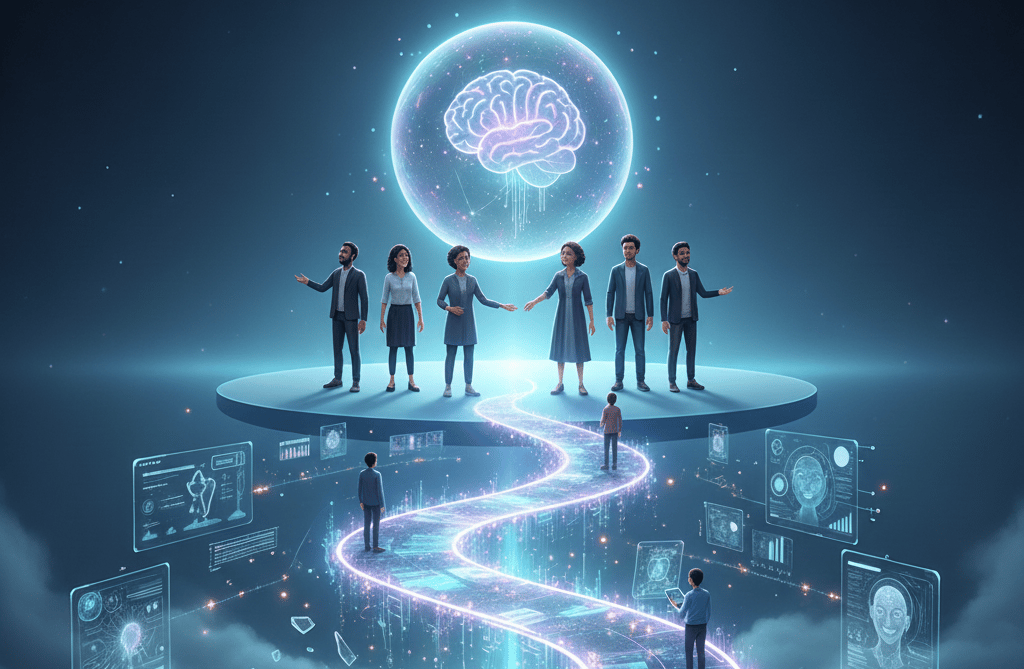Designing Coaching Systems of the Future — The Path Beyond Disruption
Explore how executive coaching is evolving from one-on-one sessions to systemic coaching systems that integrate AI, hybrid coaching roles, employee experience (EX), and customer experience (CX). This final chapter of the series reveals how leaders can thrive in disruption-as-climate by building adaptive, ethical, and experience-driven organizations. Learn why the future of coaching is not about managing disruption but about designing it responsibly—through systemic frameworks, hybrid partnerships, and leadership qualities that inspire trust, innovation, and resilience.
Nivarti Jayaram
9/9/20253 min read


“The future of leadership won’t be built on individual brilliance. It will be built on coaching systems that weave together technology, humanity, and purpose.”
Why Coaching Needs a Systemic Future
The coaching profession has evolved dramatically. Once, it was a one-on-one practice: a reflective space for executives to sharpen self-awareness and improve performance. Then came systemic coaching—expanding the lens to teams, organizations, and ecosystems.
But disruption demands something more.
Leaders no longer need coaching as a one-off intervention. They need integrated coaching systems—woven into how organizations learn, adapt, and disrupt.
Why? Because the context has shifted:
AI and technology now accelerate both risks and opportunities.
Employees demand purpose, autonomy, and inclusion.
Customers demand experiences that are seamless, ethical, and human.
Society expects organizations to address issues beyond profit—climate, equity, trust.
Coaching that stays siloed—separate from these realities—risks becoming irrelevant. The future belongs to coaching systems that connect EX (employee experience), CX (customer experience), and ecosystem responsibility into a single leadership development loop.
From Sessions to Systems
The old model of coaching:
Periodic sessions
Focused on individual goals
Evaluated on performance outcomes
The emerging model of coaching systems:
Continuous support (through human + AI blends)
Embedded into organizational culture
Anchored in EX + CX as engines of disruption
Measured not just by metrics, but by systemic transformation
This is coaching not as a service, but as an operating system for leadership and culture.
The Three Shifts Leaders and Coaches Must Embrace
1. From Individual Growth → Organizational Synergy
In disruption-as-climate, no leader can succeed alone. Coaching must amplify collective intelligence and build organizational synergies.
Leaders coached to embrace diversity harness innovation at the edges.
Teams coached together foster collaboration that spills into customer experience.
Organizations coached systemically align culture with strategy—turning EX into CX advantage.
Coaching must evolve from “How do I grow?” to “How do we thrive together?”
2. From Episodic Reflection → Continuous Learning Loops
Disruption doesn’t pause for quarterly reviews. Coaching systems must provide real-time nudges, reflections, and experiments.
AI can track leadership patterns, provide feedback loops, and suggest new questions between sessions.
Human coaches anchor the deeper reflection—intuition, sensing, courage—that AI cannot replicate.
Together, they create continuous learning systems where leaders grow in the flow of work.
The coach of the future isn’t a visitor to the leader’s journey. They’re a co-pilot on the road.
3. From Role Purity → Hybrid Partnerships
As explored earlier, leaders don’t need single-lens support. They need partners who flex—sometimes coach, sometimes mentor, sometimes challenger.
Coaching systems of the future will normalize hybridity.
Technology may handle frameworks and data.
Human partners will focus on qualities: courage, empathy, ethics, relational trust.
👉 The question shifts from “What kind of coach are you?” to “What kind of partner do you need right now?”
Tools and Frameworks for Future Coaching Systems
The Systemic Coaching Compass – guiding leaders to see self, relationships, organization, and ecosystem.
The Hybrid Coaching Roles Model – flexing roles to meet leaders’ dynamic needs.
The Disruptive Leadership Qualities Map – anchoring leadership growth in qualities, not just skills.
AI + Human Coaching Blends – using AI for reflection and nudges, humans for depth and courage.
Experience-Driven Coaching Metrics – measuring impact through improvements in EX and CX, not just performance KPIs.
These tools aren’t standalone. Together, they form a coaching operating system—a framework for leaders to thrive in complexity.
Coaching Leaders to Become Disruptors
The ultimate purpose of future coaching systems isn’t to help leaders cope with disruption. It’s to help them create disruption responsibly.
That means coaching leaders to:
See patterns across culture, customers, and ecosystems.
Challenge norms that no longer serve.
Build experiences (EX + CX) that set new standards in industries.
Anchor disruption in ethics—ensuring innovation doesn’t sacrifice trust or equity.
When leaders are coached this way, disruption stops being something they react to. It becomes something they design.
Conclusion: Tying the Series Together
Over this series, we’ve traced the journey of executive coaching at its crossroads:
From Managing Disruption to Becoming the Disruptor → Why coaching must evolve beyond performance into experience-driven disruption.
Systemic Coaching — Beyond the Individual → Expanding the lens from self to system.
The Qualities Leaders Must Embrace → Building resilience, courage, diversity, trust, and distributed leadership.
From Pure Coaching to Hybrid Partnerships → Flexing roles—coach, mentor, consultant, facilitator, challenger—to meet leaders’ real needs.
Designing Coaching Systems of the Future → Embedding coaching as an operating system that fuses AI, human wisdom, EX, CX, and systemic impact.
The thread running through all five?
Coaching is no longer just about the leader as individual. It’s about leaders as designers of systems—systems that shape employees, customers, and society.
The leaders of tomorrow won’t be remembered for how well they managed disruption. They’ll be remembered for how boldly they used disruption as a canvas to reimagine what’s possible.
And the coaches of tomorrow won’t just ask questions. They’ll build partnerships and systems that equip leaders to disrupt—wisely, inclusively, and courageously.
Leaders: What systems are you building to ensure EX and CX fuel your disruption strategy?
Coaches: How are you embedding systemic, hybrid, and experience-driven approaches into your practice?
Drop your reflections—I’d love to hear how you’re reimagining coaching and leadership for disruption-as-climate.
